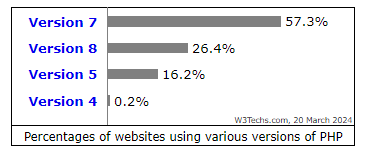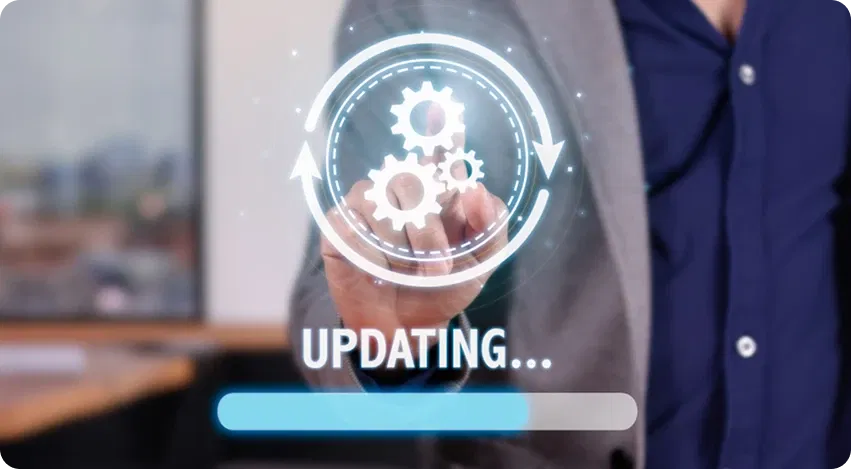PHP, the dynamic and versatile scripting language, is an indispensable tool for the development of modern web applications. With regular updates and new versions, the PHP community keeps its language up to date to improve performance, security and functionality.
In this article, we take a comprehensive look at the current state of PHP, in particular the latest developments and future challenges. Find out which versions are currently in use, what support deadlines are coming up and how we can help you future-proof your projects.
Why updates in the PHP language are important
PHP updates are essential for the security, stability and performance of web applications. One of the main reasons for regular updates is to fix security vulnerabilities. As PHP is one of the most widely used programming languages on the web, potential security risks cannot be ignored. With regular updates, you can close security gaps discovered by the community or security researchers and thus reduce the vulnerability of web applications to attacks such as SQL injection or cross-site scripting.
In addition, updates improve the stability of the language by including bug fixes and performance improvements. Errors in the PHP language can lead to unexpected behaviour of web applications and potentially affect operation. By installing updates, you can fix such errors and increase the reliability of your applications.
Another important aspect in favour of PHP updates is the support of new functions and technologies. Each update usually introduces new features that help you and your development team to write more efficient and modern code.
Another important aspect in favour of PHP updates is the support of new functions and technologies. With each update, new features are usually introduced that help you and your development team to write more efficient and modern code.
The life cycle of a PHP version using the example of PHP 8.1
PHP versions do not live forever. The life cycles of each version are clearly defined and follow a precise schedule. At the beginning of each version branch, a stable version is released, which is then fully supported for two years. PHP 8.1, for example, was released in November 2021 and fully supported until November 2023. Developers therefore received regular updates with bug fixes and security patches until last year.
At the end of the two-year phase of active support, another phase will begin in which it will only be supported for critical security issues. PHP 8.1 is currently in exactly this phase.
In November of this year, version 8.1 of PHP will reach the end of its life cycle after three years. After that, no more updates or security patches will be released for this version.
For you, this means that it is high time for an update!

The price of procrastination: Why companies hesitate when it comes to PHP updates
Nevertheless, many companies are reluctant to carry out precisely these updates. According to a survey conducted by W3Tech in March 2024, 16% of the companies surveyed are still using PHP 5, even though no security updates have been installed since 2018.
But why is that? The dangers of outdated versions are widely recognised. Nevertheless, companies often lack the capacity to carry out an update themselves. The urgency is underestimated and suddenly, years later, the website is outdated and insecure.Companies are now faced with an even greater challenge, as updating outdated websites is not only time-consuming, but also involves considerable costs.
To avoid these problems, we recommend a timely update.
What are your advantages?
Remember that updates are not just work. They offer benefits to both your website and your developers that should not be ignored:
Website security
The security of your website is crucial, especially if sensitive data is stored in the database or in files on your server. As soon as you use an outdated version of PHP, you expose yourself to a considerable risk. Hackers or malware could attack and infect your server.
Performance
Every PHP update contributes to the optimisation of your website. Not only does it improve your search engine ranking, but also the customer experience. You can keep your visitors on your website for longer and even increase your conversion rates.
New features
Every version, even small iterations, brings valuable innovations for developers and therefore your company. One example of this is PHP 8, which makes it easier for developers to write code and reduces susceptibility to errors.
Tip: At PHPBenchmarks.com you can see by how many percentage points the last updates have improved.
An overview of PHP versions
Especially for users of PHP 8.1 the active support period is slowly coming to an end. To help you keep track, we have put together a detailed table. This lists the various PHP versions, including their release date and the deadlines for active support and security support.
Take a look at the table to see how long your current PHP version will be supported and whether an upgrade is recommended:
|
PHP version |
Release date |
Active support until |
Security support until |
|
PHP 5.6 |
August 2014 |
January 2017 |
December 2018 |
|
PHP 7.0 |
December 2015 |
December 2017 |
December 2018 |
|
PHP 7.1 |
December 2016 |
December 2018 |
December 2019 |
|
PHP 7.2 |
December 2017 |
December 2019 |
November 2020 |
|
PHP 7.3 |
December 2018 |
December 2020 |
December 2021 |
|
PHP 7.4 |
November 2019 |
November 2021 |
November 2022 |
|
PHP 8.0 |
November 2020 |
November 2022 |
November 2023 |
|
PHP 8.1 |
November 2021 |
November 2023 |
November 2025 |
|
PHP 8.2 |
December 2022 |
December 2024 |
December 2026 |
|
PHP 8.3 |
November 2023 |
November 2025 |
November 2027 |
Compatibility carousel: Shopware and the right PHP version
Although it is always advisable to update promptly, you should always take the time to check compatibility with your current Shopware version. This is because not every version is supported by PHP.
In the following table you will find information on compatibility and your respective update options:
|
Shopware version |
Minimum PHP requirement |
Update options |
|
5.7.8 (or higher) |
8.1 |
Update to PHP 8.1 possible |
|
5.7.17 (or higher) |
8.2 |
Update to PHP 8.2 possible |
|
6 |
8.1, 8.2 |
Compatible with PHP 8.1 and 8.2 |
|
6.6 |
8.2 |
Minimum requirement: PHP 8.2 |
We are happy to support you: Your PHP update process with elio
If you are not sure whether your system needs an update, the elio team will be happy to help you. Our experts will first check whether you need an update and then carry out a compatibility check in consultation with you.
You will then receive a customised and detailed update plan. Together with you, the team will then make your systems compatible, carry out the corresponding individual updates and, if necessary, initiate these with the manufacturers of third-party plug-ins. This is followed by extensive functional tests to ensure that everything works smoothly. Only then will your shop go online with the new PHP version. Arrange your non-binding initial consultation now.
Conclusion
Once you have gained an overview of the different PHP versions and their end of support, you will realise that the time for an upgrade often passes faster than you think. Don't forget the importance of compatibility with your Shopware installation to ensure smooth operation. Use the possibilities of modern PHP versions to future-proof your online presence and offer your customers an optimised shopping experience.






